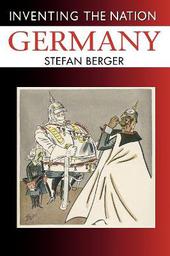
|
Germany
Paperback / softback
Main Details
| Title |
Germany
|
| Authors and Contributors |
By (author) Prof. Stefan Berger
|
| Series | Inventing the Nation |
|---|
| Physical Properties |
| Format:Paperback / softback | | Pages:320 | | Dimensions(mm): Height 234,Width 156 |
|
| ISBN/Barcode |
9780340705841
|
| Classifications | Dewey:943 |
|---|
| Audience | | Undergraduate | | Professional & Vocational | | Postgraduate, Research & Scholarly | |
|---|
|
Publishing Details |
| Publisher |
Bloomsbury Publishing PLC
|
| Imprint |
Hodder Arnold
|
| Publication Date |
25 June 2004 |
| Publication Country |
United Kingdom
|
Description
'What is a German's fatherland?', asked Ernst Moritz Arndt at the beginning of the nineteenth century. This has arguably been the central question of modern Germans did not have a united fatherland until 1871, and, thereafter, major political events in 1918, 1933, 1945, 1968 and 1989 ensured that the answers to Arndt's question proliferated and diverged with breath-taking speed. Germany explains the diverse ways in which national identity has been constructed over more than three centuries. It focuses on the plurality of contested definitions of 'Germanness'. The themes covered include the struggles between democratic and non-democratic inventions of the nation, the construction of the racial nation under Nazism, economic definitions of the nation, foreigners and 'Germanness', the nation as a 'community of memory', the gendering of the national discourse, the federal nature of German nationalism and the impact of war on the construction of a German national identity. This is a fundamental reappraisal of Germany's history from a perspective available only now that the dust from the demolished Berlin Wall is settling in a reunited Germany.
Author Biography
Stefan Berger is Professor of Modern and Contemporary History at the University of Glamorgan, UK
Reviews'[Berger's] insightful guide over this slippery but crucial terrain convincingly shows how each different 'Germany' was dependent on its predecessors and contemporary events.' * Choice * 'It is overall an interesting, balanced, and very readable account of a fascinating and pertinent topic.' * Central European History Vol 38, No 4 *
|